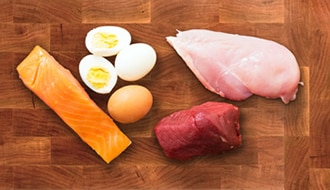Eating Right with Kidney Failure
Why should I keep track of what I eat and drink?
The choices you make about what to eat and drink can help you feel better and can make your kidney failure treatments work better. Eating the right foods may give you more energy and strength.
Healthy kidneys balance the salts and minerals—such as calcium, phosphorus, sodium, and potassium—that circulate in your blood. When you have kidney failure, what you eat and drink may help you maintain a healthy balance of salts and minerals in your body.

The kind of kidney failure treatment you’ve chosen will affect your eating plan. If you have a kidney transplant, you’ll have fewer limits to your diet.
How can I learn what I should eat?
All dialysis and transplant centers have a dietitian who can help you plan your meals. A renal dietitian has special training in counseling people with kidney failure.
Nutrition counseling from a registered dietitian to help meet your medical or health goals is called medical nutrition therapy (MNT). Medicare pays for MNT for people with kidney disease with a written referral from your doctor. If you have insurance other than Medicare, ask if it covers MNT for kidney failure. You will also need a referral from your health care provider to a dietitian for MNT services.
You can find a registered dietitian online through the Academy of Nutrition and Dietetics or through your health care provider. Work closely with your dietitian to develop a meal plan that includes foods and drinks you enjoy eating while maintaining your health.
What will I need to change?
You will need to keep track of what you eat and drink. Changes may need to be made based on your blood test results. Nutrients are substances found in food that your body needs to function and maintain health—for example, water, sodium, protein, phosphorus, potassium, vitamins, and other minerals. Your diet can supply nutrients that are lost through treatment, or you might need to limit certain nutrients you eat that can build up in your body. You may also need to keep track of how many calories are in what you eat and drink.
You may need to keep track of the following:
Water
Water is in drinks such as coffee, tea, and soda; and in foods such as fruits, vegetables, ice cream, gelatin, soup, and popsicles. Your body needs water to function properly; however, in kidney failure, the kidneys can’t get rid of extra water. Taking in too much water can cause swelling, raise your blood pressure, and make your heart work harder.
Sodium
Sodium is a part of salt. You can find sodium in many canned, packaged, processed, and fast foods and in some seasonings. You need sodium to help control the amount of fluid in your body. However, too much sodium may cause high blood pressure. No matter what treatment you’re on, it’s likely you will need to limit sodium intake.

Protein
Protein provides the building blocks that help maintain and repair muscles, organs, and other parts of the body. Protein is in many foods you eat, including foods from animals and plants. Most diets include both types of protein. Too much protein can cause waste to build up in your blood, making your kidneys work harder.

Phosphorus
Phosphorus is balanced with calcium to keep your bones healthy. When you have kidney disease, phosphorus can build up in your blood. Too much phosphorus can weaken your bones.
Phosphorus is found naturally in foods rich in protein, such as meat, poultry, fish, nuts, beans, and dairy products. Phosphorus is also added to many processed foods, such as lunch meats. Phosphorus added to food may cause your blood levels to rise more than the phosphorus that is naturally found in food.
Your dietitian can help you find ways to get the protein you need without getting too much phosphorus.
Potassium
Potassium is a mineral that helps your nerves and muscles work. Potassium is found in fruits and vegetables such as oranges, bananas, tomatoes, and potatoes. Your nerve cells and brain will not work well if your potassium is too high or too low. If you have kidney failure, your potassium level may tend to be high. You may need to limit foods that are high in potassium.
Supplements for people with kidney failure
Supplements help provide some of the vitamins and minerals you may be missing, either because you need to avoid certain foods or because your treatment removes some vitamins from your body. Your health care professional may prescribe a supplement made for people with kidney failure. You should only take vitamin, mineral, or dietary supplements that your provider has recommended. Over-the-counter (no prescription needed) supplements not recommended by your providers may be harmful to you.
Calories
You need energy to fuel your body. Energy is measured in calories. Taking in more calories than your body uses can cause weight gain and high blood sugar. Taking in fewer calories than your body uses will result in weight loss.

Work with your dietitian to learn how you can make changes to what you eat and drink. Learn more about eating right for hemodialysis.
This content is provided as a service of the National Institute of Diabetes and Digestive and Kidney Diseases
(NIDDK), part of the National Institutes of Health. NIDDK translates and disseminates research findings to increase knowledge and understanding about health and disease among patients, health professionals, and the public. Content produced by NIDDK is carefully reviewed by NIDDK scientists and other experts.

